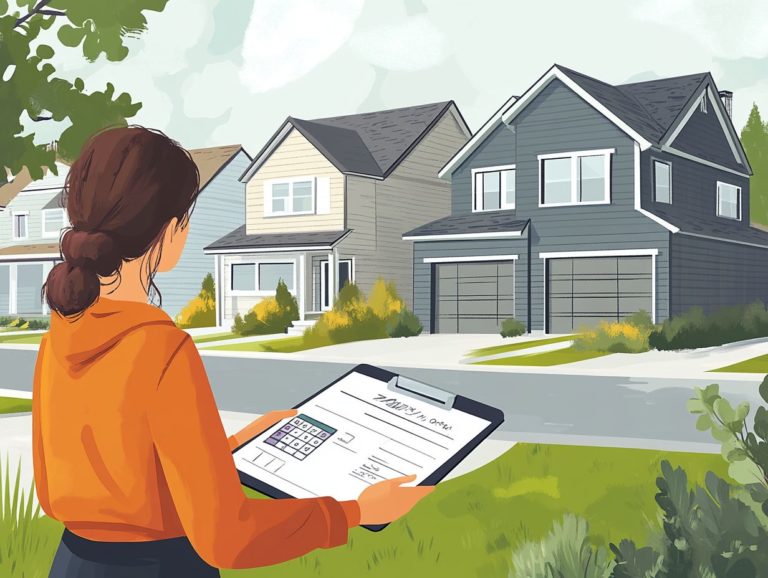How to Make Your First Home a Smart Investment
Get ready to embark on an amazing journey to homeownership! Your dream home is within reach, and it can also be a fantastic investment.
With the right insights, this experience can become a wise investment that appreciates over time.
As you navigate this process, key factors to consider include location, current market trends, and essential smart home features that enhance your investment s potential.
Explore financing strategies to ensure your new abode remains a valuable asset.
Prepare to turn your dream of homeownership into a shrewd financial decision!
Contents
- Key Takeaways:
- Factors to Consider Before Buying
- Smart Home Features to Look For
- Financing Your First Home Purchase
- Maximizing the Investment Potential
- Tips for Managing and Maintaining Your Investment
- Frequently Asked Questions
- What are some ways to make my first home a smart investment?
- How important is doing prior research before investing in a home?
- Should I consider the potential for rental income when buying my first home?
- What are some features to look for in a home that can make it a smart investment?
- Are there any tax benefits to making my first home a smart investment?
- Should I seek the help of a professional when making my first home a smart investment?
Key Takeaways:

Location is key when considering a first home investment. Evaluate market trends and budget before making a decision.
When searching for a smart home, look for features that offer benefits and potential return on investment.
Don’t let budget constraints hold you back from purchasing your first home. Explore financing options and consider renovating for increased value.
Why is it a Smart Investment?
Investing in real estate is a smart financial move. Owning a home comes with potential for long-term value growth, tax benefits, and the security of a tangible asset.
By grasping the homebuying process and collaborating with a knowledgeable real estate agent, you can improve your chances of making an investment that aligns with your financial readiness and homeownership goals.
Historical data on home values shows consistent appreciation over time, reinforcing that real estate is a dependable avenue for building wealth. By analyzing market trends, you can pinpoint the ideal moments to enter the market, ensuring you make the most of your investment.
Working with a skilled real estate agent offers invaluable insights into neighborhoods poised for growth, helping you identify properties with a bright future. Moreover, homeownership comes with financial advantages, such as tax deductions for mortgage interest and property taxes, which can substantially lower the actual cost of ownership.
Understanding how real estate fits into your broader retirement strategy enables you to leverage your properties as a source of future income or a solid nest egg.
Factors to Consider Before Buying
Before you embark on the journey of buying a home, several crucial factors must be evaluated. Begin by assessing your financial readiness, determining the necessary down payment, and understanding how mortgage lenders shape your budget and eligibility.
Familiarize yourself with how much of your income goes to paying off debts and calculate a manageable budget. This preparation will enable you to make a sound investment decision in today’s housing market.
Location, Market Trends, and Budget
The location of a property plays a pivotal role in determining home values. It’s essential to analyze local market trends and establish a realistic budget before making a purchase.
A comprehensive evaluation of the housing market in your desired area taking into account factors like school districts and nearby amenities will enable you to make informed decisions that align with your financial aspirations.
As you consider your budget, don t overlook the desirability of the neighborhood or any anticipated future developments that could enhance or diminish property values.
Understanding comparable home values in the vicinity is crucial; it provides insight into your investment and sheds light on the market’s stability or volatility. Consider factors like crime rates; they can significantly impact your overall affordability.
By carefully weighing these elements, you can navigate the complexities of the real estate market with confidence, positioning yourself for a successful purchase.
Smart Home Features to Look For

When you evaluate potential homes, consider incorporating smart home features. They greatly enhance your living experience and increase the property’s long-term resale value.
Key aspects like energy efficiency, automation technology, and user-friendly interfaces don t just add modern convenience; they also help reduce utility costs and promote a more sustainable lifestyle.
Benefits and Potential ROI
Investing in smart home features elevates your comfort and convenience. It opens the door to significant long-term benefits, including potential returns on investment through energy savings and property appreciation.
As you understand today s tough housing market, it’s clear that homebuyers are placing a premium on properties equipped with advanced technology. These features are a pivotal selling point.
Energy savings are a major benefit. With smart thermostats, automated lighting, and energy-efficient appliances, you can dramatically cut down on utility bills and save money over time.
The convenience of voice-activated systems and smartphone controls streamlines your daily routines, transforming your lifestyle into something notably more appealing.
Smart technology is changing real estate. Homes with these features attract more buyers and often increase in value faster than traditional homes. This makes them a wise investment for the future.
Financing Your First Home Purchase
Financing your first home purchase requires a clear grasp of the various mortgage options available, such as FHA loans and conventional loans.
Securing mortgage pre-approval from lenders can significantly amplify your buying power, giving you an edge in a competitive market.
It s crucial to conduct a thorough budget calculation to determine the financing option that aligns seamlessly with your financial situation and long-term aspirations.
Options and Strategies for Affordability
To achieve affordability in purchasing a home, explore options like down payment assistance and effective budgeting strategies. Understand the implications of private mortgage insurance (PMI), which protects the lender if you stop making payments.
Collaborating with mortgage lenders will help you assess your financial readiness and guide you toward the most cost-effective path to homeownership.
As a first-time homebuyer, you can greatly benefit from researching local and state programs that offer grants or low-interest loans. These resources can significantly reduce your initial costs.
Incorporating practical budgeting techniques, like tracking your monthly expenses and setting savings goals, enhances your ability to make informed decisions.
Having a clear understanding of PMI is crucial, as it can impact your monthly payments and overall affordability. By proactively assessing your financial situation, you can navigate the complexities of the market with greater confidence and secure a home that aligns perfectly with your budget.
Maximizing the Investment Potential

Maximizing the investment potential of your home can be accomplished through thoughtful renovations and strategic upgrades designed to elevate its market value.
By prioritizing high-return improvements, you can ensure your property stands out in the housing market while enhancing its overall appeal as an investment.
Renovations and Upgrades for Increased Value
Renovations and upgrades, like kitchen remodels and bathroom improvements, are some of the most effective ways to elevate your home’s value and attract potential buyers.
For example, a kitchen upgrade can yield an impressive return on investment (ROI) of around 80%. Imagine upgraded countertops, modern appliances, and improved lighting transforming the space into a buyer’s dream.
Prioritizing bathroom renovations especially those that refresh fixtures and optimize space can help you recoup nearly 70% of your costs. Don t stop there; enhancing curb appeal with thoughtful landscaping, a fresh coat of paint, and updated entryways can create a lasting first impression.
Energy-efficient improvements, such as new windows, insulation, and smart home technology, attract environmentally conscious buyers and can lead to substantial savings on utility bills, boasting an ROI of 75% or more.
These strategic modifications create a perfect blend of functionality and aesthetics, significantly elevating property values.
Tips for Managing and Maintaining Your Investment
Managing and maintaining your investment requires a proactive approach.
This includes effective home maintenance and property management, alongside cost-effective strategies and thoughtful budgeting.
By keeping up with regular maintenance and understanding your home insurance options, you can safeguard your investment while minimizing unexpected expenses.
Cost-effective Strategies for Maintenance
Implementing cost-effective strategies for home maintenance can lead to significant savings over time.
Regular inspections help you pinpoint potential issues before they escalate, allowing for timely and affordable minor repairs.
Engaging in DIY repairs not only enhances your skill set but also fosters a sense of accomplishment!
Establishing a maintenance budget encourages proactive planning and helps allocate resources effectively for both minor and major repairs.
Home warranties provide peace of mind by covering unexpected breakdowns, making the entire process less daunting.
Frequently Asked Questions
Here are some common questions about making your first home a smart investment:

What are some ways to make my first home a smart investment?
Some ways to make your first home a smart investment include researching the location and potential resale value, buying in a growing market, and considering what to look for in your first home regarding long-term rental potential.
How important is doing prior research before investing in a home?
Prior research is crucial for making your first home a smart investment.
This includes researching the market, the neighborhood, and the potential for future growth.
Should I consider the potential for rental income when buying my first home?
Yes! Considering the potential for rental income can be a wise decision when buying your first home.
This can create a fantastic steady stream of passive income and increase the overall value of your investment.
What are some features to look for in a home that can make it a smart investment?
Some features to look for include a desirable location, a good school district, and potential for future renovations or updates.
Are there any tax benefits to making my first home a smart investment?
Yes, there are tax benefits! These can include deductions for mortgage interest, property taxes, and potential depreciation expenses.
Should I seek the help of a professional when making my first home a smart investment?
While it is possible to make a smart investment in your first home on your own, seeking the advice of a professional, such as a real estate agent or financial advisor, can provide valuable insights, especially on how to make an offer on your first home, guiding you throughout the process.






